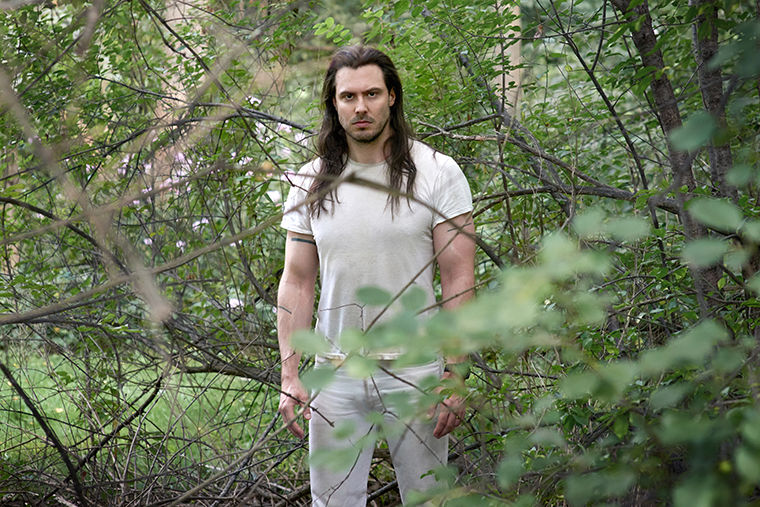Andrew W.K. ‘baffled’ in partying whirlwind
Party king Andrew W.K. will play Oct. 21 at the Vic Theatre, 3145 N. Sheffield Ave.
October 16, 2017
Known for his early 2000s hits “Party Hard,” “She is Beautiful” and “We Want Fun,” prolific party animal Andrew W.K., whose full name is Andrew Wikles-Krier, quickly branched out from his unique brand of pop-metal to a slew of television appearances, books, motivational speaking tours and acting gigs.
After making his way through being an advice columnist and host of the Cartoon Network show “Destroy Build Destroy,” Andrew is returning to music March 2, 2018, with his first album since 2011’s Japan exclusive The “Party All Goddamn Night” EP.
Andrew will return to Chicago Oct. 21 at the Vic Theatre, 3145 N. Sheffield Ave., just a month after his sixth Riot Fest performance.
The Chronicle spoke to Andrew about his new album, message and future plans.
THE CHRONICLE: You’re working on a new album—does it have a name yet?
ANDREW W.K.: All the audio is done—the recording, mixing and mastering—we can begin working on the title and the artwork and all the other elements that help complete the package.
Is it in line with your past work?
Definitely. I have my method of trying to reach a place of physical, emotional and mental euphoria, and that’s the only place I’m interested in getting to, so here’s another collection of efforts of trying to get to that place—one moment at a time, one song at a time, one album at a time.
You’ve been at it for 16 years. Do you think you’re going to slow down?
I have to speed up. You speed up the further you get along, that’s the idea. You’ve got less and less time, so you have to do more and more and more with what you have left.
You’ve done everything from TV to motivational speaking. Is there anything you’d still like to do?
Tons of stuff, but it’s not for me to decide, just like I didn’t decide to do any of those things. I wouldn’t even take credit for [mapping] out some kind of plan like that. My only plan was to party as hard as possible, and this has been the result. I’m very thankful for it, and the best I can do is to try to make the most of each opportunity that emerges in the midst of all this partying. I don’t think anyone’s more baffled or shocked than I am that any of this happened.
Your message revolves around loving every second of life. Do your Midwest values from being raised in Michigan play into your positive message?
I never thought about what Midwest values are, but I suppose I must be imbued with them to some extent since I spent those formative years there. When I was born, we were in California, and [my dad] wanted to move back to the Midwest so that my brother and I would have a Midwestern childhood—first and foremost—just to have real distinct seasonal changes throughout the year. It seems like there’s a really fantastic vortex throughout the Midwest for uplifting, powerful rock music, and that goes from Michigan to Illinois—a Great Lakes vortex, even up into Canada.
Do the black line tattoos on your arms mean anything in particular?
They actually have no meaning. They don’t represent, symbolize or express anything other than lines. It was an attempt to have a tattoo that didn’t mean anything, so I guess that’s their meaning. I’m not planning on getting any more.
The U.S. Department of State invited you to be the cultural ambassador to Bahrain in 2012 but retracted the offer. What made them skittish?
Once we announced it, there was such an unexpectedly passionate response—largely positive from my perspective—that these higher-ups in the State Department suddenly became aware. They saw the photo of me with the bloody nose [on the cover of 2001’s I Get Wet] and said it was inappropriate for someone that looked like me and has songs about partying to represent the United States in that capacity. They canceled it and specifically said it was a waste of taxpayers’ money. Maybe it was.
I also thought it was inappropriate, and I never thought the U.S. government would want anything to do with me—and for good reason. It was moving that I had this opportunity to represent this country that I love. There’s countries that have extraordinary restrictions on an individual’s ability to follow their path. I was excited about getting to promote the values that we can indulge in here—that you can make rock and roll music if you want.
We had been working on the project with our representative from the State Department for over a year at that point, so it was a long vetting process. We went through all of that, and the background checks and all the planning. We had the plane tickets and the itinerary and everything, and that’s when we announced it with their blessing. That was when they changed their mind.
You said in a previous interview that you grew up going to really rowdy shows. Is that where you got your “party hard” aesthetic?
Yeah, intense shows for sure—people just going completely crazy in a way where it didn’t even seem there was an option to approach music or performing any other way. I was initiated into a mode of living that you just go all out, and I wasn’t presented with another option. If you’re going to do it, you do it as intensely as you possibly can.








